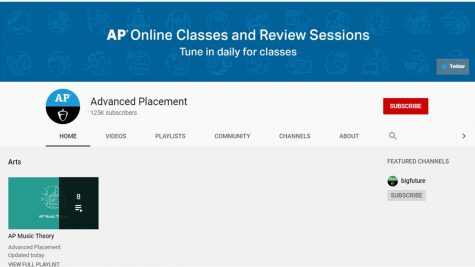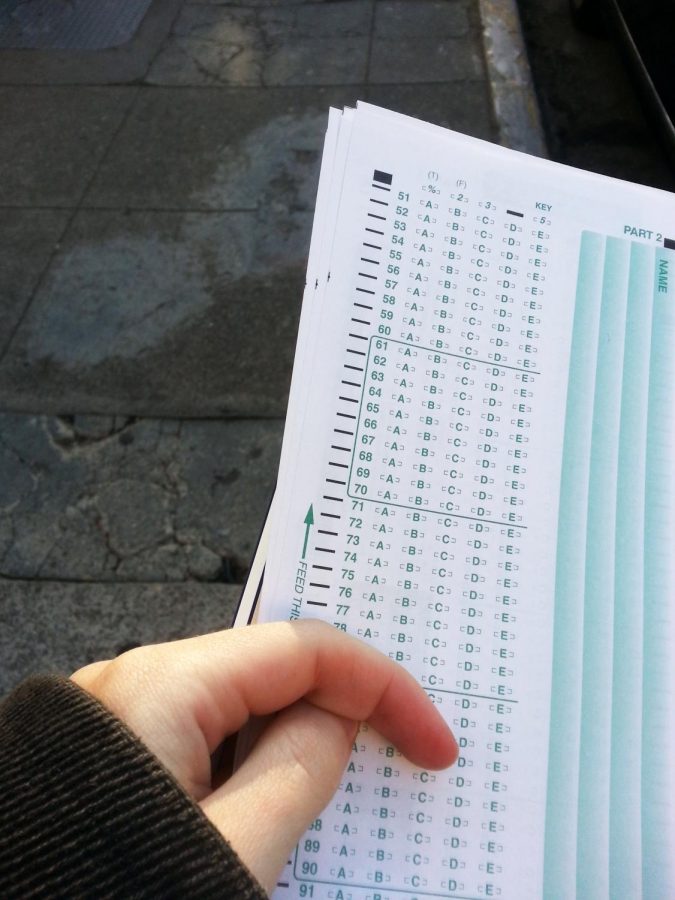In Light of COVID-19, The College Board Changes the AP Testing Format
What To Anticipate With Upcoming Tests
A student holds a standard scantron.
April 1, 2020
In light of school closures around the world and rising concerns of COVID-19 spread, on March 20th the College Board announced changes in the administration of the AP Test. The test, typically featuring multiple sections varying by course, will be shortened to a single 45-minute free-response session to be taken online at home by students. Test dates and specific details of the test structure have yet to be released, but another update is scheduled for Friday, April 3rd. Tests will be accessible via computer, tablet, or smartphone, with answers submitted digitally or through a photo of a handwritten response.
Traditional in-person tests were canceled preemptively to prevent the spread of the coronavirus, as most tests require large groups of students to gather under the watch of a proctor for hours at a time. The College Board surveyed 18,000 AP Students before finalizing their decision, with an outcome of 91% preferring that the test still be administered instead of canceled. However, given the change in the format of the test and preparation time, the College Board has announced that students who initially registered to take the test won’t be charged to cancel.
“With regards to students who may now decide to opt-out of taking the test, I would encourage those students to utilize all of the review materials that will be available to them—classroom teacher supplied materials and those resources provided by the College Board, to name a few—and perhaps wait until the exam dates draw closer. And then have a very honest conversation with their classroom teacher about whether or not they should take the exam. Many students have worked incredibly hard to get to this point, and I would hate to see them miss out on the opportunity to earn a passing grade, typically three or higher, on those AP exams,” said Mrs. Keller, the Gifted Resource teacher at Doherty High School.
To accommodate the lost prep-time with teachers, many tests have also shortened the expanse of what the final AP tests will cover. A chart below shows what updated tests will be covering for the courses offered at Doherty.
| AP Course | Test questions will cover: | Test questions won’t cover: | Exam Question Types: | First Test Date: | |
| AP Studio Art | N/A | N/A | Selected Works: 3 works required (instead of 5) to be submitted digitally + Sustained Investigation: 10 images required (instead of 15), also submitted digitally | Selected Works: 3 works required (instead of 5) to be submitted digitally + Sustained Investigation: 10 images required (instead of 15), also submitted digitally | |
| AP English Language and Composition | Units 1-7 | Units 8-9 | 45 minutes to read and respond to Question 1 and then 5 minutes to upload their response. | May 20th
at 12:00 pm |
|
| AP Literature and Composition | Units 1-7 | Units 8-9 | 45 minutes to read and respond to Question 1 and then 5 minutes to upload their response. | May 13th at 12:00 pm | |
| AP Calculus AB | Units 1-7 | Unit 8 | 25 minutes to read and respond to Question 1, and then 5 minutes to upload their response. After uploading the response to Question 1, students will have 15 minutes to respond to Question 2, with 5 additional minutes to upload their response to Question 2 | May 12th at 12:00 pm | |
| AP Calculus BC | Units 1-8 + Unit 10 (Sections 10.2, 10.5, 10.7, 10.8, and 10.11) | Unit 9 and Unit 10 (excluding 10.2, 10.5, 10.7, 10.8, and 10.11) | 25 minutes to read and respond to Question 1, and then 5 minutes to upload their response. After uploading the response to Question 1, students will have 15 minutes to respond to Question 2, with 5 additional minutes to upload their response to Question 2 | May 12th at 12:00 pm | |
| AP Statistics | Units 1-7 | Units 8-9 | 25 minutes to read and respond to Question 1, and then 5 minutes to upload their response. After uploading the response to Question 1, students will have 15 minutes to respond to Question 2, with 5 additional minutes to upload their response to Question 2 | May 22nd at 12:00 pm | |
| AP U.S. History | Units 1-7 | Units 8-9 | 45 minutes to read and respond to Question 1 and then 5 minutes to upload their response. | May 15th at 12:00 pm | |
| AP U.S. Government | Units 1-3 | Units 4-5 | 25 minutes to read and respond to Question 1, and then 5 minutes to upload their response. After uploading the response to Question 1, students will have 15 minutes to respond to Question 2, with 5 additional minutes to upload their response to Question 2 | May 11th at 2:00 pm | |
| AP Human Geography | Units 1-5 | Units 6-7 | 25 minutes to read and respond to Question 1, and then 5 minutes to upload their response. After uploading the response to Question 1, students will have 15 minutes to respond to Question 2, with 5 additional minutes to upload their response to Question 2 | May 12th at 2:00 pm | |
| AP European History | Units 1-7 | Units 8-9 | 45 minutes to read and respond to Question 1 and then 5 minutes to upload their response. | May 13th at 2:00 pm | |
| AP Psychology | Units 1-7 | Units 8-9 | 25 minutes to read and respond to Question 1, and then 5 minutes to upload their response. After uploading the response to Question 1, students will have 15 minutes to respond to Question 2, with 5 additional minutes to upload their response to Question 2 | May 19th at 12:00 pm | |
| AP French | Units 1-4 | Units 5-6 | May 21st at 10:00 am | ||
| AP German | Units 1-4 | Units 5-6 | May 2oth at 10:00 am | ||
| AP Spanish | Units 1-4 | Units 5-6 | May 14th at 10:00 am | ||
| AP Seminar | N/A | N/A | Individual Research Report + Individual Written Argument only (no team or individual presentations or end-of-course exam) | Digital Portfolio due date extended for all students to May 26 at 11:59 p.m. ET | |
| AP Research | N/A | N/A | Academic Paper Only (no presentation) | Digital Portfolio due date extended for all students to May 26 at 11:59 p.m. ET | |
| AP Chemistry | Units 1-7 | Units 8-9 | 25 minutes to read and respond to Question 1, and then 5 minutes to upload their response. After uploading the response to Question 1, students will have 15 minutes to respond to Question 2, with 5 additional minutes to upload their response to Question 2 | May 14th at 12:00 pm | |
| AP Biology | Units 1-6 | Units 7-8 | 25 minutes to read and respond to Question 1, and then 5 minutes to upload their response. After uploading the response to Question 1, students will have 15 minutes to respond to Question 2, with 5 additional minutes to upload their response to Question 2 | May 18th at 12:00 pm | |
| AP Computer Science | Units 1-7 | Units 8-10 | 25 minutes to read and respond to Question 1, and then 5 minutes to upload their response. After uploading the response to Question 1, students will have 15 minutes to respond to Question 2, with 5 additional minutes to upload their response to Question 2 | May 15th at 2:00pmDigital Portfolio due date extended for all students to May 26 at 11:59 p.m. ET | |
| AP Environmental Science | Units 1-7 | Units 8-9 | 25 minutes to read and respond to Question 1, and then 5 minutes to upload their response. After uploading the response to Question 1, students will have 15 minutes to respond to Question 2, with 5 additional minutes to upload their response to Question 2 | May 18th at 2:00 pm | |
| AP Physics 1 | Units 1-7 | Units 8-10 | 25 minutes to read and respond to Question 1, and then 5 minutes to upload their response. After uploading the response to Question 1, students will have 15 minutes to respond to Question 2, with 5 additional minutes to upload their response to Question 2 | May 14th at 2:00pm, Mechanics on May 11th at 10:00 am, and Electricity and Magnetism on May 11th at 12:00 pm |
* All times are in Mountain Standard Time
*Descriptions of test questions are from the College Board
The College Board has also released new resources for students to continue studying at home. The primary new resources made available are live streams and video reviews for all AP courses on the AP YouTube Channel. Schedules for when streams and videos will be released for each course are available on the College Board website. This year the College Board also opened up more study and prep resources to students through AP Central, ranging from practice tests and questions to specific unit reviews.

A screenshot taken from the College Board AP YouTube Channel.
“I’ve seen a few of the live streams and I think it’s a great idea for students to continue receiving that instruction and extra help at home,” says sophomore student at Doherty High School, Laura Fajardo.
The College Board has administered parts of at-home and online tests in the past for the AP Capstone and AP Computer Science Principles courses. However, concerns about test-integrity and reliability linger among students.
Sophomore student at Doherty High School, Nella Allen voiced her concerns about the adapted test, saying, “I don’t think it will be a good representation of our knowledge and what we’ve been working on all year. I’m not sure it’s all that fair either because it’s a make it or break it question. If it’s something you don’t know that well then you have nothing else to make up for it. I wish it wasn’t just one question. I wish they could put some multiple choice, or even one or two more FRQ questions in the test.”
Fajardo said, “I don’t think it’ll be enough to really represent all that we’ve learned since it is only a free-response. I still will take it and I think it’s fair not to charge students. [But] I actually feel even more confident with this format…I typically do better on free response questions than I do with other [types.]”
Regarding dishonesty and cheating concerns, the College Board released a statement saying “The exam questions are designed and administered in ways that prevent cheating; we use a range of digital security tools and techniques, including plagiarism detection software, to protect the integrity of the exams.”
AP U.S. History and AP European History teacher at Doherty High School, Mr. Drummond, agrees the test format could be advantageous to students. “I believe the shortened test will be an advantage to the more prepared students. Those who understand the big picture will be more likely to recognize the key emphasis of the short responses and craft an answer that specifically addresses the question,” says Drummond.





